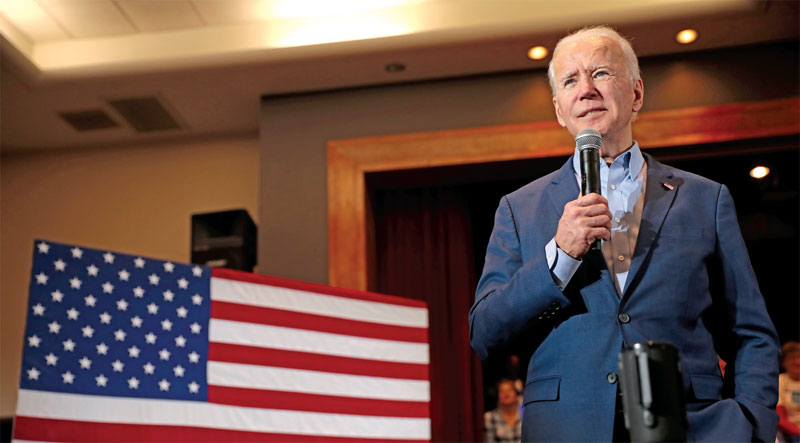US President elect Joe Biden signals hope for both fellow Americans and the world
 Col Ajay Singh
Col Ajay Singh
At noon on 20 January 2021, Joseph Robinette Biden will take over as the 46th President of the United States. And it is hard not to feel a sense of relief. After four unpredictable, volatile years it could signal a return to stability and continuity in US policies. Something much needed in a nation deeply fractured from within and in a world that seems poised towards a new order.
The new president will have his job cut out for him. He must heal the scars caused by racial and communal divide. He must fight a raging pandemic that has caused 10 million casualties and 2,40,000 deaths in the US itself. He must restore faith in his allies and stave off an increasingly aggressive China. He must also reverse some especially toxic policy decisions and reset the US back in its traditional role of leadership in world affairs.
At 77, he is one of the oldest US presidents and has 47 years of political experience. As a foreign policy expert, he has been the Chairman of the Senate Foreign Relations Committee and served two terms as vice president under Barack Obama from 2009-17. The credentials are impressive all right, but he will need all his vast experience and maturity to steer the US in the years ahead.
Likely Priorities
Joe Biden’s immediate priority would be to curb the Covid-19 which rages unchecked across the US largely due to Trump’s lackadaisical attitude to it. Reviving the US economy will again top the list. He would also have ‘to heal and repair’ and undo some of President Trump’s more damaging policies. Fortunately, in most cases, the reversal process would not be difficult. Most of Trump’s policies were imposed through Executive diktats since he could not carry the Senate or the House of Representatives with him. It would just take a stroke of his presidential pen to undo them.
More difficult would be redeeming the image and trust of the US in the eyes of the world and its allies. Regaining the US world leadership and retaking the ground ceded to China and Russia in the past four years would be more difficult, and even more essential.
So, what would be some of his likely actions and priorities. Relations with China, now at its lowest ebb since 1979, would top the list. China is too big for the US to de-couple itself from—economically or politically—and it is likely that it will continue to engage China economically. While the Trump administration was scathing in its criticism of China, such open expressions of hostility are unlikely to follow. (Though Biden himself denounced Xi Jinping as ‘a thug’). He is unlikely to be soft on China, as is feared in some quarters. But the response would be measured and would be based on gathering alliances and coalitions—perhaps of ‘like-minded democracies.’ The counter to China in areas such as freedom of navigation, incursions in the China seas, Hong Kong and Taiwan would be stronger. There would also be greater criticism of the treatment of Uighur and minorities and perhaps the very authoritarianism of the Chinese Communist regime.

With Russia though, the new regime is likely to take a harsher line. Trump shared a personal equation with Putin, while Biden has a known animosity. He had even pushed for sanctions against Russia over its annexation of Crimea in 2014. The US will not allow Russia’s slow creep in Europe to go unchallenged. And the crux would be in restoring faith with European allies and reviving the shaken NATO alliance.
Biden has stated that he is willing to rejoin the US-Iran Nuclear Deal and reverse ‘a disastrous failure of the US foreign policy’ but it may already be a little too late. A smarting Iran is unlikely to enter into another agreement. Nor will it halt its nuclear programme or lay it open to scrutiny now. But as a start, the US sanctions on Iran could be lifted and negotiations could be recommenced.
Militarily, the US could recalibrate its forces toward the Indo-Pacific, and continue its deployments in the Middle East, Korea and Japan. While Biden will follow Trump’s policy of withdrawing from Afghanistan, it is likely that the schedule could be delayed to prevent a complete free run to the Taliban. A more calibrated withdrawal may be on the cards, which will be vital for the Afghan government.
A welcome reversal would be on climate change. Biden has already announced that one of his first acts—on 20 January 2021 itself—would be to send a letter to the United Nations, announcing that the US will rejoin the Paris Climate Accord. This will give global impetus to this vital issue which Trump withdrew peremptorily from. He is also likely to renew the 2010 New Strategic Arms Reduction Treaty—something Trump was disdainful of. Biden has openly stated that he will extend it without pre-conditions, thus ensuring that a vital tool in the preservation of world peace remains in place. Organisations such as the WTO, (which Trump threatened to withdraw from calling ‘the single worst trade deal ever made’), WHO (to which the US stopped funding) and even the United Nations will also see a fresh re-engagement, which would strengthen these institutions and counter China’s insidious presence in world bodies.
You must be logged in to view this content.

